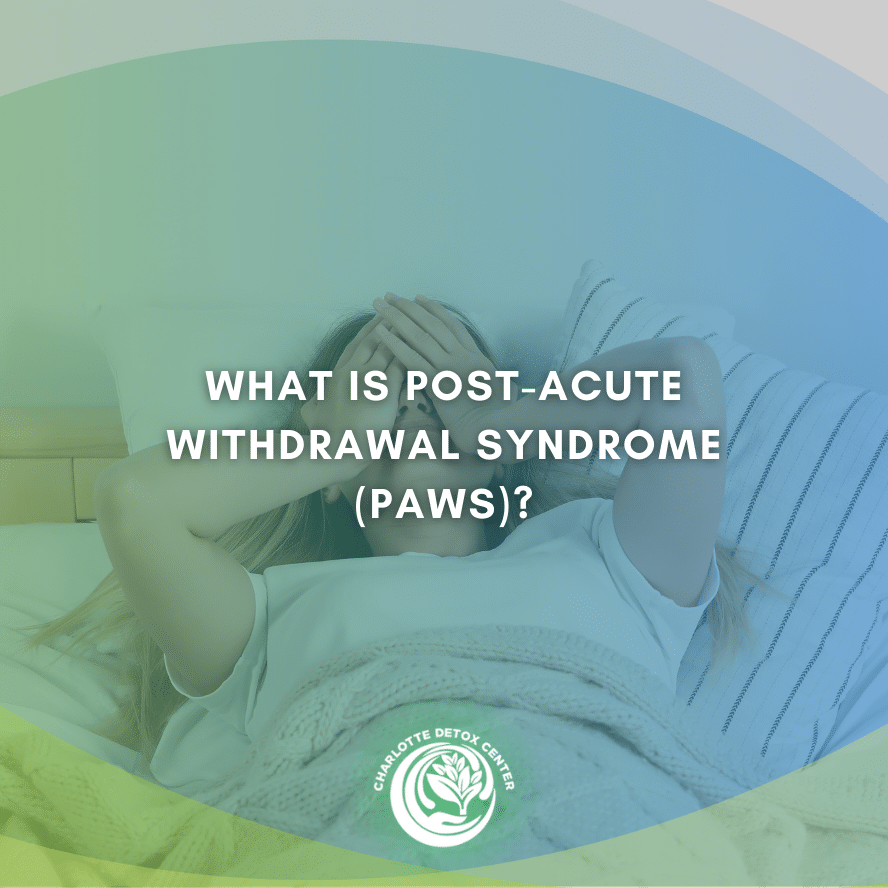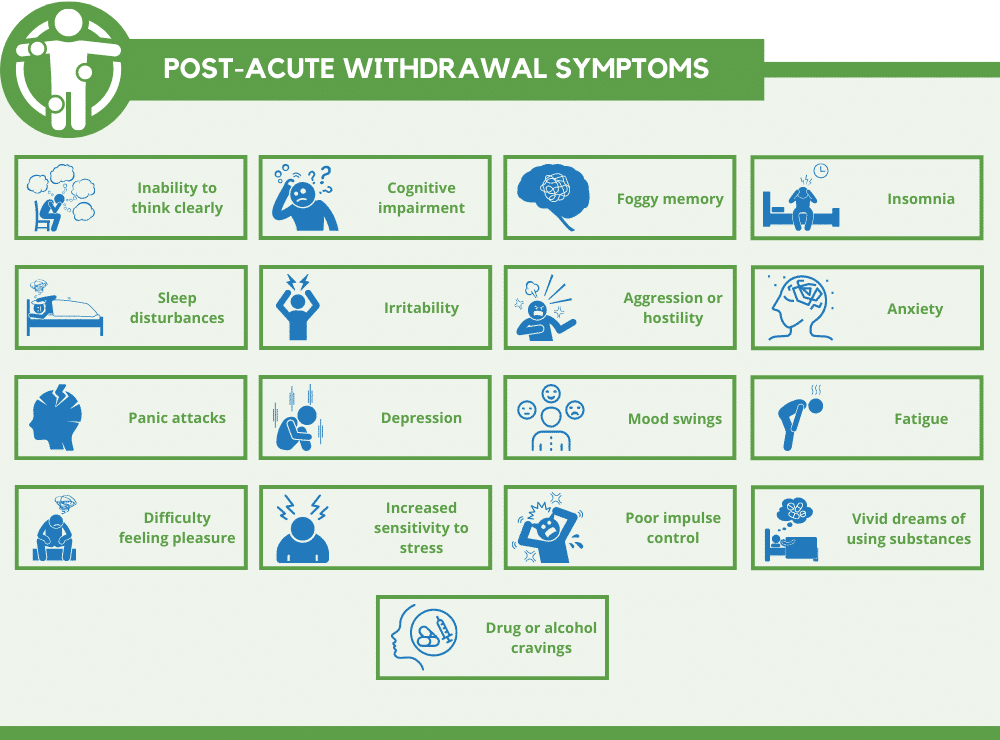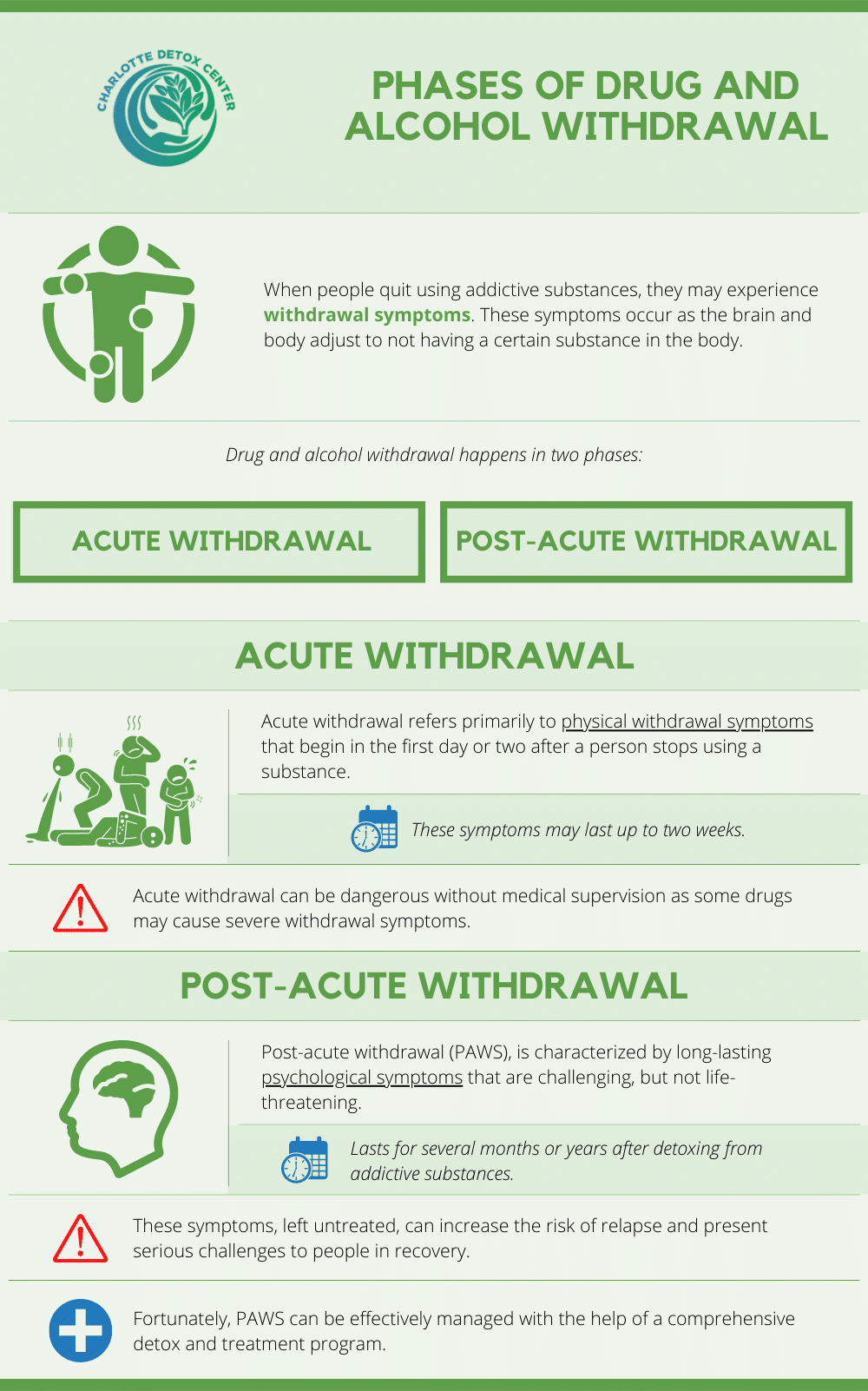What is Post-Acute Withdrawal Syndrome (PAWS)?

Medically Verified: 2/1/24
Medical Reviewer
Chief Editor

All of the information on this page has been reviewed and verified by a certified addiction professional.
When people quit using addictive substances, they may experience withdrawal symptoms. These symptoms occur as the brain and body adjust to not having a certain substance in the body. Drug and alcohol withdrawal happens in two phases:
- Acute withdrawal
- Post-acute withdrawal
Acute withdrawal refers primarily to physical withdrawal symptoms that begin in the first day or two after a person stops using a substance. These symptoms may last up to two weeks. Acute withdrawal can be dangerous without medical supervision as some drugs may cause severe withdrawal symptoms.[1] Post-acute withdrawal, however, is characterized by long-lasting psychological symptoms that are challenging, but not life-threatening.
Post-acute withdrawal syndrome, commonly known as PAWS, refers to psychological and emotional symptoms that last for several months or years after detoxing from addictive substances. These symptoms, left untreated, can increase the risk of relapse and present serious challenges to people in recovery. Fortunately, PAWS can be effectively managed with the help of a comprehensive detox and treatment program.
Understanding Post-Acute Withdrawal Syndrome (PAWS) and Why it Occurs
PAWS refers to a variety of different symptoms that some people with chronic addictions experience after a prolonged period of drug or alcohol withdrawal. Post-acute withdrawal happens due to chemical imbalances in the brain after enduring years of substance abuse.
People who abuse substances for an extended period of time become physically and psychologically dependent on the substance they are abusing. Their mind and body require the substance to function normally. However, once that substance is removed from the body, the brain goes into overdrive in an attempt to correct the chemical imbalances and learn how to function properly without drugs or alcohol. Although the acute phase of withdrawal only lasts 1-2 weeks, it takes the brain far longer to recover from years and years of addiction. PAWS is the result of chronic substance use disorder and the brain trying to recover.
Some people are more likely to experience PAWS than others, such as those who:
- Have been addicted to drugs or alcohol for several years
- Have severe substance use disorder
- Struggle with co-occurring mental or behavioral health conditions
Symptoms of Post-Acute Withdrawal
Symptoms of post-acute withdrawal syndrome (PAWS) are different from those of acute withdrawal. These symptoms are primarily mood and mental health-related, but they can feel just as intense as the physical symptoms of acute withdrawal. Some of the most common symptoms of PAWS are:[2]

- Inability to think clearly
- Cognitive impairment
- Foggy thought processes and memory
- Insomnia
- Sleep disturbances
- Irritability, aggression, or hostility
- Anxiety and panic attacks
- Depression
- Mood swings
- Low energy or fatigue
- Difficulty feeling pleasure (anhedonia)
- Increased sensitivity to stress
- Poor impulse control
- Vivid dreams of using substances
- Drug or alcohol cravings
The length of a person’s addiction, which substance was abused, and overall health can impact the severity and duration of post-acute withdrawal symptoms. Similarly, symptoms may come and go. Some days may be better than others and some symptoms may last longer than others do.
Drugs That May Cause Post-Acute Withdrawal Syndrome (PAWS)
There are many different substances that can cause PAWS. Some of the most frequently abused include:
Marijuana
Although there is a general misconception among many people that marijuana is not addictive, some studies suggest up to 47% of regular cannabis users experience withdrawal upon cessation.[3] Further, many regular cannabis users reported experiencing symptoms like insomnia, anxiety, irritability, and headaches after completing acute detox. These symptoms can last for a month or more after quitting marijuana.
Opioids
One type of drug most commonly associated with PAWS is opioids. Drugs like heroin, fentanyl, oxycodone, morphine, and codeine may cause insomnia, anxiety, depression, and brain fog for several months.[4]
Stimulants (Cocaine and Methamphetamine)
Stimulant drugs like cocaine and methamphetamine produce emotional and psychological symptoms as early as 24 hours after the last dose. However, stimulants can also cause PAWS with symptoms like lack of impulse control and depression that last for months or years.
Benzodiazepines
Benzodiazepines are often prescribed to treat anxiety and seizures, but they are also a drug of abuse. Whether a person takes a prescription benzodiazepine too long or they abuse benzodiazepines and get addicted, medications like Xanax, Valium, and Klonopin can cause PAWS. Symptoms may include anxiety, panic attacks, depression, and cravings.[2]
Alcohol
The acute phase of alcohol withdrawal can be dangerous and even life-threatening, but the post-acute phase can be mentally daunting. Post-acute symptoms of alcohol withdrawal include cravings, exhaustion, and brain fog.
How Long Does PAWS Last?
How long post-acute withdrawal syndrome lasts varies from one person to the next. The overall duration depends on:
- How long a substance was abused and how often
- The regular dose consumed
- Mental or behavioral health conditions
- An individual’s current health and lifestyle habits
Symptoms of PAWS typically begin 7-14 days after the acute stage of withdrawal ends. Symptoms may be worse in the beginning and fade over time, or they may fluctuate throughout each day. PAWS may last for up to two years.
The main concern during this timeline is the risk of relapse. Since individuals may struggle with mood swings, impulse control, and cravings, it can be tempting to use drugs or alcohol for symptom relief. However, making lifestyle changes in combination with a comprehensive addiction treatment program can help alleviate symptoms.
Coping With Post-Acute Withdrawal Symptoms
There are two parts of treating PAWS:
- Professional addiction treatment
- Self-treatment with lifestyle changes
During rehab, therapists focus on treating patients’ unique needs, including post-acute withdrawal. Patients will participate in holistic therapies, such as yoga, meditation, and massage, all of which help alleviate stress and restore the balance of the mind, body, and spirit. At the same time, patients also participate in behavioral therapies to learn a variety of coping and relapse prevention skills, such as:
- Identifying triggers
- Changing negative thought processes
- Improving communication skills
- Learning about recovery resources in the area
- Practicing impulse control
- Learning about healthy lifestyle changes
Outside of treatment, patients are encouraged to make major lifestyle changes that support a sober lifestyle. These practices can also help reduce post-acute withdrawal symptoms.
- Eating a healthy, balanced diet
- Getting plenty of exercises
- Talking to a support group
- Practicing self-care
- Journaling
- Relaxation techniques
Find Help Today
Post-acute withdrawal syndrome (PAWS) can be tedious and challenging, but it is nothing you can’t overcome without self-care and professional substance abuse treatment. Here at Charlotte Detox Center, we’ll help you get through the acute phase of detox safely and find a rehab program that will address symptoms of PAWS. Learn more about our detox programs or speak with an addiction specialist today by giving us a phone call. We’re eager to help.
References:

